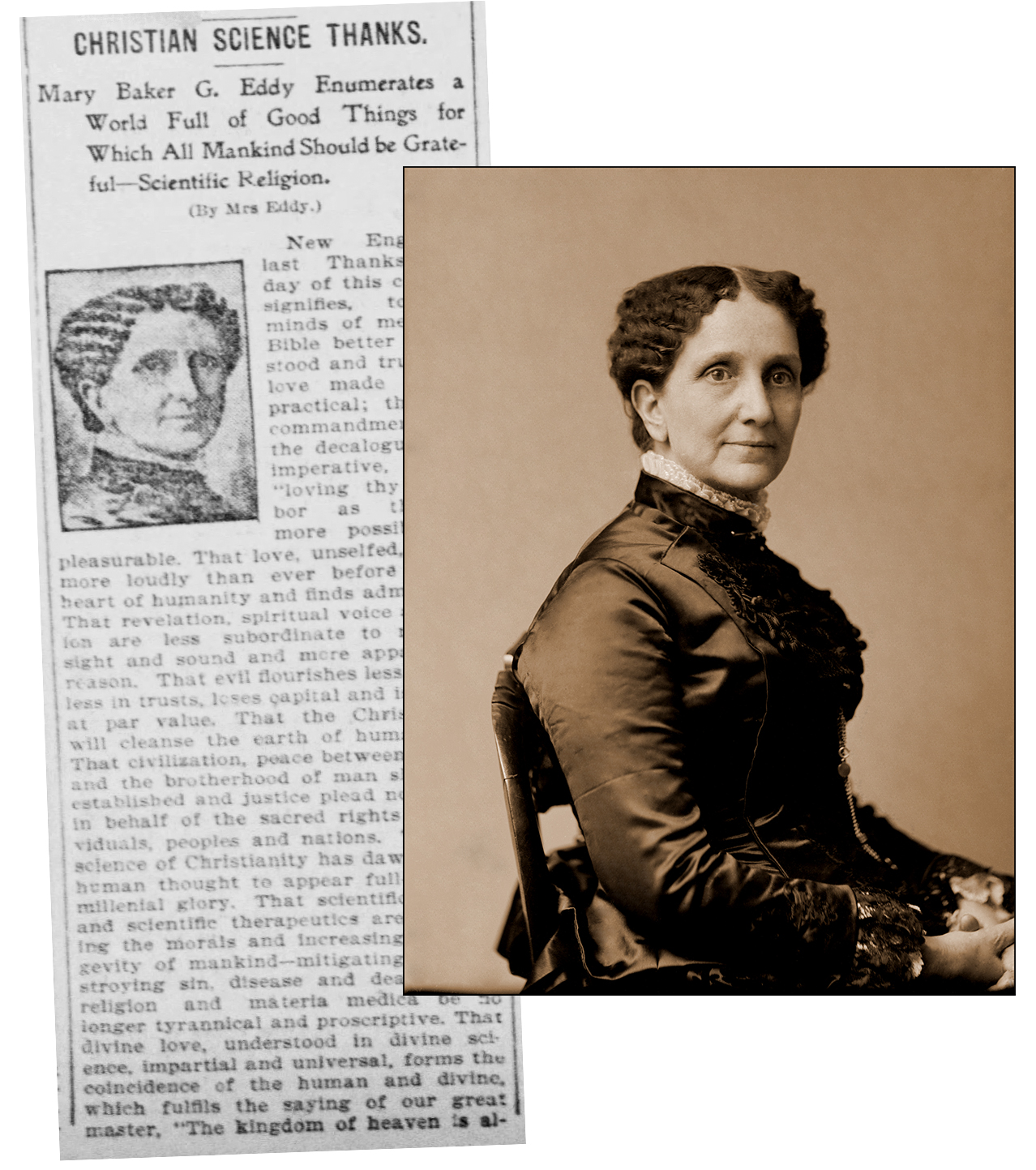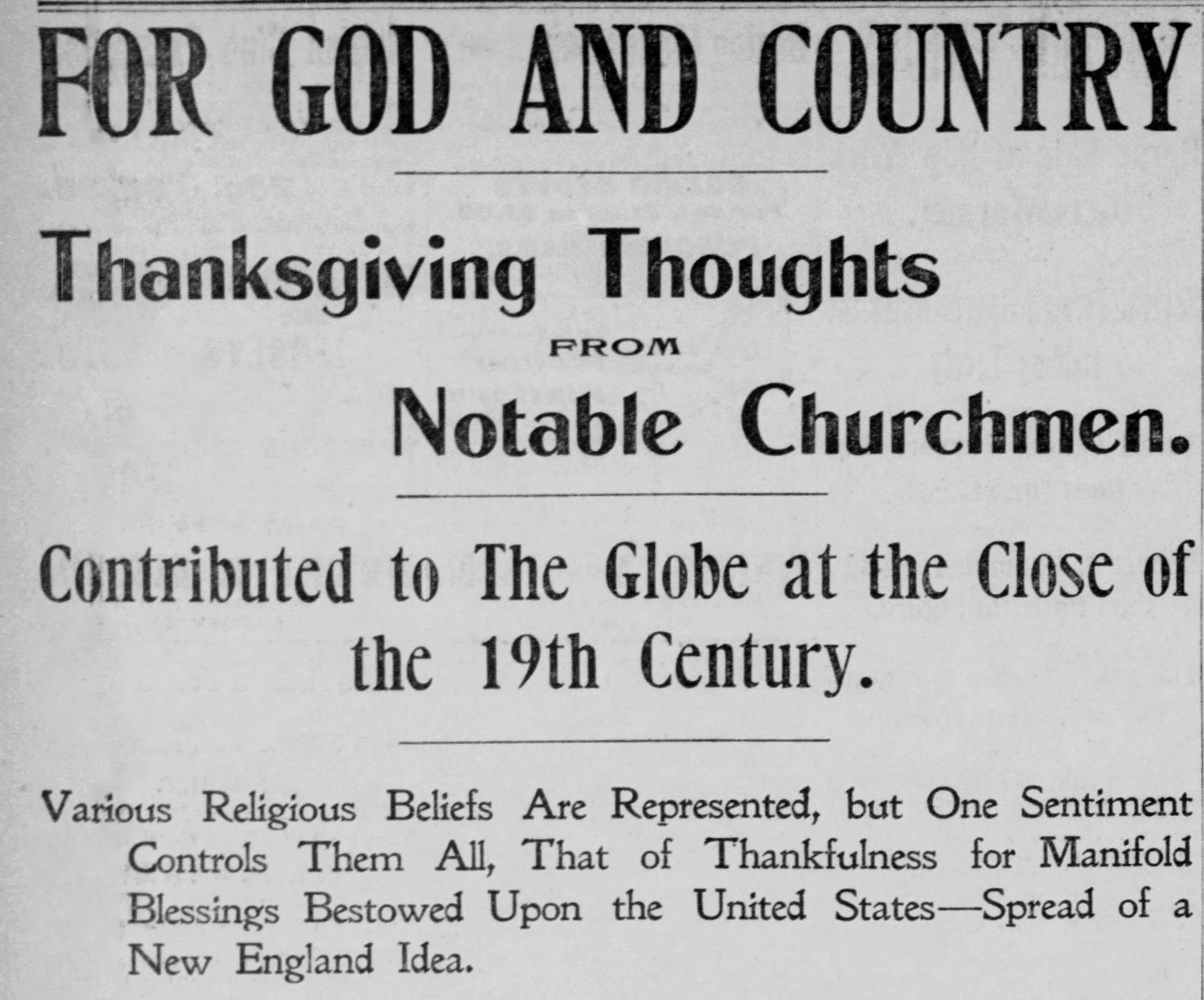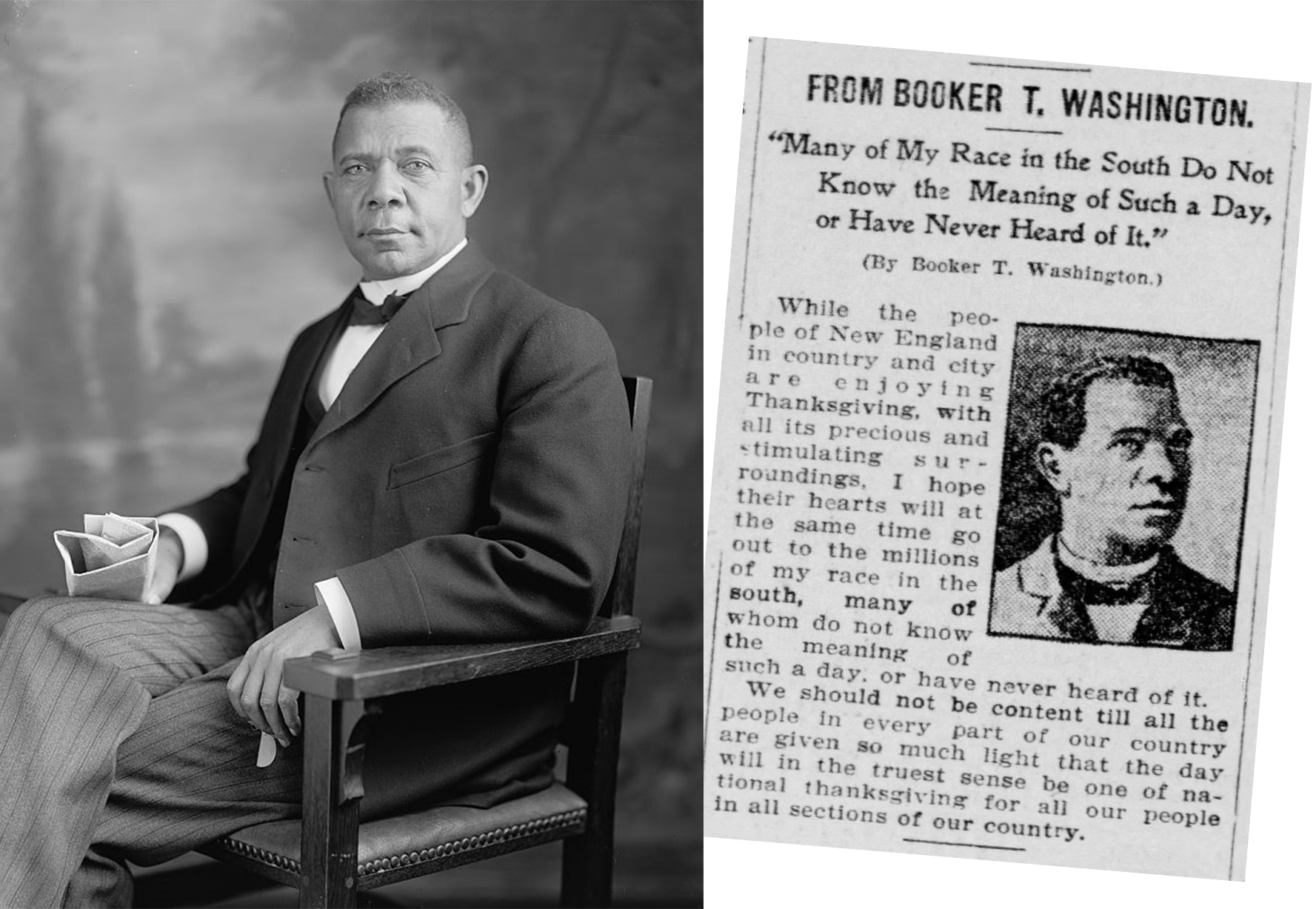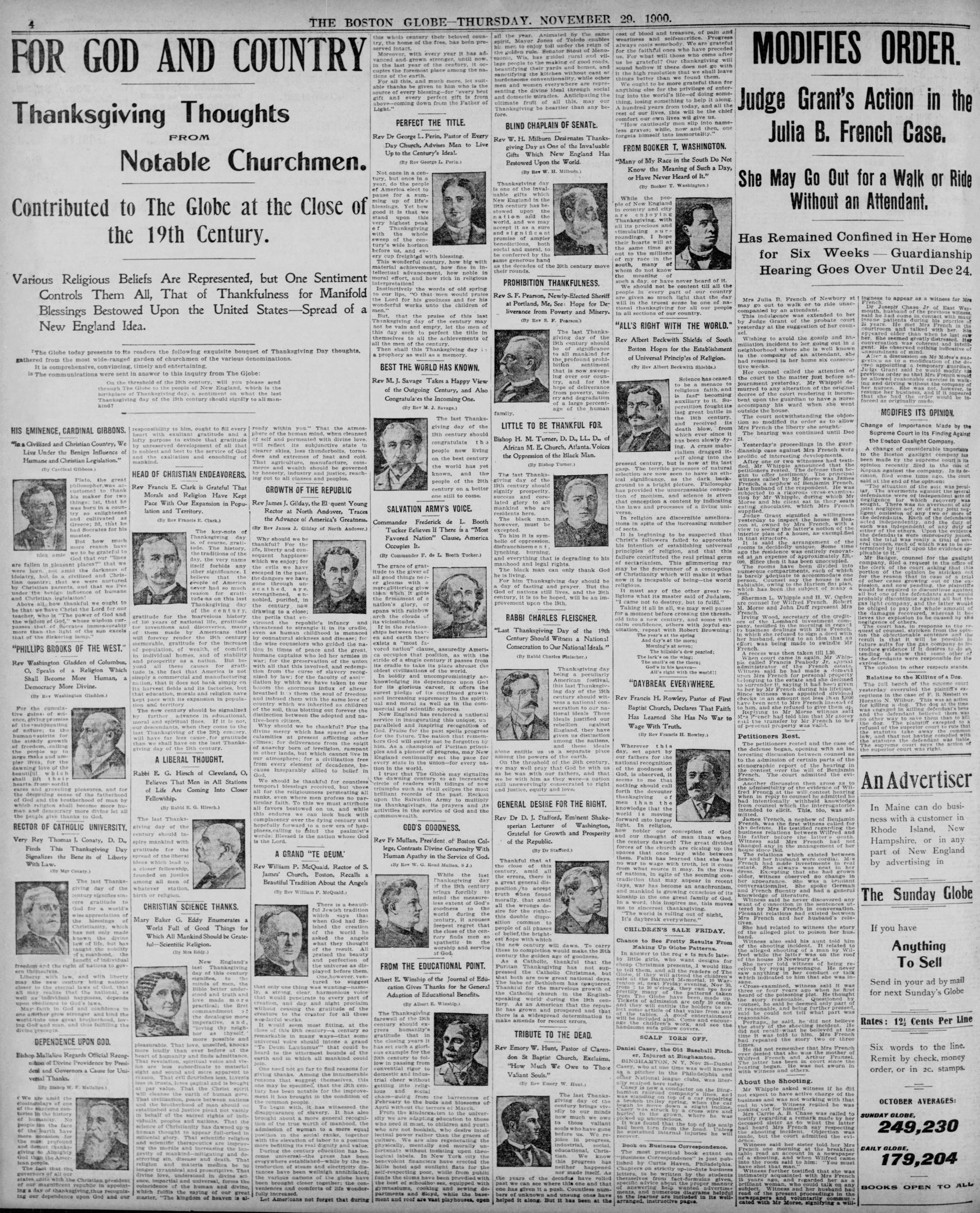It was Thanksgiving at the dawn of the 20th century, and prospects were bright. The Boston Globe sent an appeal to religious luminaries of the day—clergy of many faiths and other people of moral influence—inquiring what Thanksgiving Day 1900 should signify to mankind. The result was an “exquisite bouquet of Thanksgiving thoughts, gathered from the most wide-ranged garden of churchmen,” wrote the Globe.1
There was one noteworthy woman among all these “churchmen,” and that was Mary Baker Eddy.

“New England’s last Thanksgiving Day of this century,” began Mrs. Eddy, “signifies to the minds of men the Bible better understood and Truth and Love made more practical; the First Commandment of the Decalogue more imperative, and ‘Love thy neighbor as thyself’ more possible and pleasurable.”2

Having discovered and founded Christian Science several decades earlier, it was fitting that the century’s final Thanksgiving would also symbolize to her how “the Science of Christianity has dawned upon human thought to appear full-orbed in millennial glory….”
The responses of the 22 others who appeared alongside Mrs. Eddy in the Nov. 29, 1900, issue of the Globe, are striking, poignant, and forthright. All are hopeful, and some are honest about the challenges facing the 20th century.
“In religion, how nobler our conception of God and our thought of man than when the century dawned!” wrote the Rev. Francis H. Rowley, pastor of the First Baptist Church in Boston. “Mankind is growing conscious of its kinship in the one great family of God.”
Rev. Dr. George L. Perin, pastor of Boston’s Every-Day Church, welcomed that year’s Thanksgiving Day with joy and praise. “Not once in a century, but once in a year, do the people of America elect to pause for a summing up of life’s blessings,” he shared. “This wonderful century, how big with material achievement, how fine in intellectual advancement, how noble in moral effort, and how rich in religious interpretation!”
Commander Frederick de L. Booth-Tucker, son-in-law of the Salvation Army’s founders, put it eloquently when he said, “Praise for the past spells progress for the future. The nation that remembers God will surely not be forgotten by him.”
Booker T. Washington, educator, author, orator, and advocate for the rights of African Americans, struck a more somber tone. “While the people of New England in country and city are enjoying Thanksgiving, with all its precious and stimulating surroundings,” he wrote, “I hope their hearts will at the same time go out to the millions of my race in the south, many of whom do not know the meaning of such a day, or have never heard of it.

“We should not be content till all the people in every part of our country are given so much light that the day will in the truest sense be one of national thanksgiving for all our people in all sections of our country,” he concluded.
The contributors to the Boston Globe were an accomplished and diverse group. One was a blind Methodist clergyman who served as a Chaplain in the Senate and the United States House of Representatives. Another worked for the Salvation Army in Bombay to counteract the Indian caste system. One clergyman, who advocated for the unionization of employees, was a prolific writer and wrote two poems that were published in the Christian Science Hymnal.3 Another championed animal welfare and the humane movement. Two contributors were Black men. One was born in India. Although from vastly different denominations and religions, all the contributors shared a common theme: God and goodwill toward men.
On the threshold of the 20th century, Mary Baker Eddy brought a unique perspective to the array of voices. To her, Thanksgiving in the year 1900 signified much, including “that the Christ-spirit will cleanse the earth of human gore,” “that civilization, peace between nations, and the brotherhood of man should be established,” and “that agriculture, manufacture, commerce, and wealth should be governed by honesty, industry, and justice….” “For these signs of the times,” Mary Baker Eddy concluded in gratitude, “we thank our Father-Mother God.” Her entire response to the Globe, which was later edited and included in The First Church of Christ, Scientist, and Miscellany, follows.
[Boston Globe, November 29, 1900]
CHRISTIAN SCIENCE THANKS
On the threshold of the twentieth century, will you please send through the Globe to the people of New England, which is the birthplace of Thanksgiving Day, a sentiment on what the last Thanksgiving Day of the nineteenth century should signify to all mankind?
Mrs. Eddy’s Response
New England’s last Thanksgiving Day of this century signifies to the minds of men the Bible better understood and Truth and Love made more practical; the First Commandment of the Decalogue more imperative, and “Love thy neighbor as thyself” more possible and pleasurable.
It signifies that love, unselfed, knocks more loudly than ever before at the heart of humanity and that it finds admittance; that revelation, spiritual voice and vision, are less subordinate to material sight and sound and more apparent to reason; that evil flourishes less, invests less in trusts, loses capital, and is bought at par value; that the Christ-spirit will cleanse the earth of human gore; that civilization, peace between nations, and the brotherhood of man should be established, and justice plead not vainly in behalf of the sacred rights of individuals, peoples, and nations.
It signifies that the Science of Christianity has dawned upon human thought to appear full-orbed in millennial glory; that scientific religion and scientific therapeutics are improving the morals and increasing the longevity of mankind, are mitigating and destroying sin, disease, and death; that religion and materia medica should be no longer tyrannical and proscriptive; that divine Love, impartial and universal, as understood in divine Science, forms the coincidence of the human and divine, which fulfils the saying of our great Master, “The kingdom of God is within you;” that the atmosphere of the human mind, when cleansed of self and permeated with divine Love, will reflect this purified subjective state in clearer skies, less thunderbolts, tornadoes, and extremes of heat and cold; that agriculture, manufacture, commerce, and wealth should be governed by honesty, industry, and justice, reaching out to all classes and peoples. For these signs of the times we thank our Father-Mother God.
